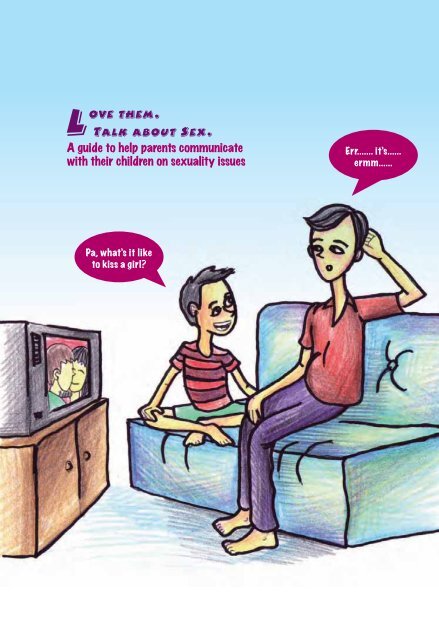Love them. Talk about Sex. - Parents in Education
Love them. Talk about Sex. - Parents in Education
Love them. Talk about Sex. - Parents in Education
- No tags were found...
Create successful ePaper yourself
Turn your PDF publications into a flip-book with our unique Google optimized e-Paper software.
<strong>Love</strong> <strong>them</strong>.<strong>Talk</strong> <strong>about</strong> <strong>Sex</strong>.A guide to help parents communicatewith their children on sexuality issuesErr....... it’s......ermm......Pa, what’s it liketo kiss a girl?
CONTENTSIntroduction 2Communication 4Changes 10Challenges 18Consequences 26
3Communication will give you tips on talk<strong>in</strong>g to your child <strong>about</strong> sexuality issues.Changes will touch on how you can help your child cope with the physical and psychologicalchanges that arise dur<strong>in</strong>g puberty.Challenges will deal with the key issues you and your child will face as he/she enters the peak ofpuberty and beyond.Consequences will help you highlight to your child the consequences of unprotected sex, namelyunwanted pregnancy and sexually transmitted <strong>in</strong>fections, on the rise among teens <strong>in</strong> S<strong>in</strong>gapore.The ages suggested <strong>in</strong> the follow<strong>in</strong>g pages are just a guide. You will know your child best todecide when to talk to him/her <strong>about</strong> the various aspects of sexuality. Suggestions havebeen provided for handl<strong>in</strong>g commonly surfaced issues. You may wish to adapt <strong>them</strong> to suit your ownunique family circumstances.<strong>Talk</strong><strong>in</strong>g <strong>about</strong> sex with your child is not easy. But, it can be a great way tobuild your relationship and trust with your child. Start and you will f<strong>in</strong>dthat it gets easier. But first, you need to be prepared yourself.• Build up your knowledge <strong>about</strong> sexuality issues. Get more <strong>in</strong>formation from other parents orresources e.g. books, magaz<strong>in</strong>es, websites, etc.• <strong>Talk</strong> to your spouse beforehand and decide on what messages you wantto give (e.g. are you go<strong>in</strong>g to talk <strong>about</strong> abst<strong>in</strong>ence only or do you wantto <strong>in</strong>clude <strong>in</strong>formation on protection?).
4COMMUNICATIONW hat you want to achieveA healthy relationship with your child that is open, not judgemental,and able to give and take.Any dialogue with your child, particularly on sexuality issues, is <strong>about</strong> communicat<strong>in</strong>g. This is morethan just tell<strong>in</strong>g your child what you want him or her to know.Golden rules of good communicationPay attentionSwitch off the TV, put down the papers, put away your mobile phone, and look at your child. Itshows he/she is important to you and that you are will<strong>in</strong>g to give him/her the time to discuss andask questions.Listen<strong>in</strong>g is not the same as hear<strong>in</strong>gMany people can hear, but not everyone listens well. Listen<strong>in</strong>g means keep<strong>in</strong>g eye contact, not talk<strong>in</strong>gwhen your child is talk<strong>in</strong>g, lett<strong>in</strong>g him/her f<strong>in</strong>ish and not <strong>in</strong>terrupt<strong>in</strong>g when you th<strong>in</strong>k he/she has saidsometh<strong>in</strong>g silly or embarras<strong>in</strong>g.Ask <strong>in</strong>stead of tell<strong>in</strong>gInstead of preach<strong>in</strong>g or tell<strong>in</strong>g your child how th<strong>in</strong>gs should be, ask questions that will help you tounderstand him/her better. “How do you feel <strong>about</strong> this? What do you th<strong>in</strong>k might be the consequences?How does it feel when that happens?” Ask open-ended questions to allow your child to expla<strong>in</strong> his/herthoughts, feel<strong>in</strong>gs and wishes. And when you do talk <strong>about</strong> your wishes, make sure you expla<strong>in</strong> WHYyou feel that way. Don’t just say: “I don’t want you to have sex, just study!” Expla<strong>in</strong> why early sex mightbe confus<strong>in</strong>g to your child, because while his/her body is all adult, his/her m<strong>in</strong>d isn’t ready for such acomplicated th<strong>in</strong>g and it can lead to serious consequences.Ask open-ended questions to allow your child toexpla<strong>in</strong> his/her thoughts, feel<strong>in</strong>gs and wishes.
5Avoid attackYour child is not your enemy but your words can be. When you belittle or criticize, you will lose youraudience, sometimes never to get it back aga<strong>in</strong>. So don’t drag out a long list of past “mistakes”. Respectyour child as an honest, <strong>in</strong>telligent and lov<strong>in</strong>g person and he/she is more likely to do th<strong>in</strong>gs to keepyour respect.Never give up on communicat<strong>in</strong>gIf you face a set back, f<strong>in</strong>d a person who can help out, preferably someone your child trusts, and don’t<strong>in</strong>terfere. Be prepared to also adjust your views and expectations. The world you grew up <strong>in</strong> was avery different place from the one your child is <strong>in</strong> now. The pressures he/she faces are tremendous andhe/she may be f<strong>in</strong>d<strong>in</strong>g it hard to cope.
6When to start the conversation on sexThe <strong>in</strong>formation has to come <strong>in</strong> the right doses – just like medication. For toddlers, talk <strong>about</strong> parts ofthe body. For eight year olds, extend this talk to their reproductive systems and by 11 or 12 years ofage, you can <strong>in</strong>troduce what happens when two people have sex. By 13, you can talk <strong>about</strong> dat<strong>in</strong>g andconsequences of early sexual activity.Remember, this is just a guide - you know your child best and hence the right time to <strong>in</strong>itiate thisconversation. In general, if you start this conversation when your child is 15, experts say it might betoo late. He/she might have formed op<strong>in</strong>ions and ideas from friends and other sources and you wouldhave missed the boat. However, if you are already <strong>in</strong> this situation, you should still try.How to start the conversation on sexSeize “teachable moments”When you see a pregnant woman, that may be a good way to start a conversation on how babies areborn. Or when you come across condoms <strong>in</strong> the supermarket and your child asks what they are, it canalso lead to a discussion on hav<strong>in</strong>g babies. When you are watch<strong>in</strong>g a movie together and a love scenecomes up, you can talk <strong>about</strong> be<strong>in</strong>g <strong>in</strong> love and why people fall <strong>in</strong> love. If your child asks you someth<strong>in</strong>g<strong>about</strong> his/her body or <strong>about</strong> relationships, use that to get a discussion go<strong>in</strong>g.
7Start on an honest noteLet your teen know right from the start where the conversation is go<strong>in</strong>g. Your child might be likely tofeel embarrassed to talk <strong>about</strong> <strong>in</strong>timate sexual feel<strong>in</strong>gs. Seek your child’s consent upfront by say<strong>in</strong>gsometh<strong>in</strong>g like “I want to be a good parent but I am not go<strong>in</strong>g to ask you embarrass<strong>in</strong>g questions”. Thenyour child is likely to feel more at ease.Ask questionsIt would be great if your child asks questions – you can use these to go deeper <strong>in</strong>to the topic. But, ifyour child is not ask<strong>in</strong>g anyth<strong>in</strong>g, here are some questions you can ask to start a conversation:Conversation starters• Do your classmates talk <strong>about</strong> sex? What do they talk <strong>about</strong>?• Have you ever thought <strong>about</strong> hav<strong>in</strong>g a girlfriend / boyfriend?• Have you thought <strong>about</strong> when you might have sex?• Do you th<strong>in</strong>k teen sex is okay? Do you th<strong>in</strong>k some teens have sex to impress their friendsor to fit <strong>in</strong>? Why?• Have you heard or read <strong>about</strong> teenagers who are pregnant? How do you feel <strong>about</strong> that?
8What should you say?Do you say it is okay to go on s<strong>in</strong>gle dates? Is hav<strong>in</strong>g a steady relationship out of the question whenyour child is still school<strong>in</strong>g? <strong>Sex</strong> is very closely tied <strong>in</strong> with values and pr<strong>in</strong>ciples and each of us hasa different set. Some of us have religions which have very clear guidel<strong>in</strong>es on what is acceptable andwhat is not and these should be set out at the beg<strong>in</strong>n<strong>in</strong>g.It is best to decide, as a couple, what are the values and messages important to you and your familyand then to communicate these to your child. Do you want to stress abst<strong>in</strong>ence only? Or do you wantto also <strong>in</strong>clude a message on protection? This will not only depend on your values but also take <strong>in</strong>toaccount the environment your child is exposed to and the k<strong>in</strong>d of questions he or she may have.Whatever you decide, it’s important to give your child the <strong>in</strong>formation and support to make gooddecisions. This way, there’s a higher chance that your child does not engage <strong>in</strong> risky sexual behaviour.Am I ready to talkto my child?What messageto give?Is my childready?What if ourviews differ?
9It is perfectly okay to tell your child that his question is complex and that you don’t have the answer.Perhaps you can suggest that you and your child read up or discuss it and arrive at a mutuallyacceptable position.Can someone else do the talk<strong>in</strong>g for you?It is best if you do the talk<strong>in</strong>g yourself. If for whatever reason you are not able to do so, ensurethat the person you have picked to talk to your child shares the same values and objectives as youdo. Teenagers need consistency as much as young children so the messages have to be the same.Can you just get a book for <strong>them</strong> and not talk<strong>about</strong> it?Experts <strong>in</strong> S<strong>in</strong>gapore say that it has become common to hear both boys and girls say that hav<strong>in</strong>gsex is not a big deal anymore. They say kids are teased for be<strong>in</strong>g virg<strong>in</strong>s and it is “cool” to havesexual experience. So there is a chance your teen will consider hav<strong>in</strong>g sex. Your child could get lots of<strong>in</strong>formation from a book or the <strong>in</strong>ternet but these cannot communicate your values to him/her - onlyyou can.It’s important to give your child the<strong>in</strong>formation and support to makegood decisions.
10CHANGESW hatyou want to achieveA child who is healthy and aware of what is happen<strong>in</strong>g to his or herbody and how to take care of it.Your little baby has grown up and is beg<strong>in</strong>n<strong>in</strong>g to resemble a young man or woman. However, there isno magic age to start a talk on sex. You might start as early as when your child is a toddler to beg<strong>in</strong>teach<strong>in</strong>g <strong>about</strong> body parts. The actual talk <strong>about</strong> where and how babies are made probably takes placeat a later age when your child gets more curious, seeks to better understand the world around him andstarts ask<strong>in</strong>g questions .Puberty, the move from boy to man and girl to woman, can be filled with anxiety and doubt as itis accompanied by several physical and psychological changes. As parents, we can help make thistransition as smooth as possible for our children. Get a good book and go through it together. Ortake some time out to talk <strong>about</strong> “becom<strong>in</strong>g a man or woman”. Tackle the physical parts with honestyand simplicity.
11B oys<strong>Sex</strong>ual organs matureAt <strong>about</strong> 11 – 14 years of age, special hormone signals “wake” the previouslydormant testicles which then start to enlarge, gett<strong>in</strong>g ready to producetestosterone and eventually, sperm. The rest of the changes then slowly beg<strong>in</strong> toappear. Testosterone also exists <strong>in</strong> girls but boys have much more of it.As puberty beg<strong>in</strong>s, your son may f<strong>in</strong>d that he wakes up with erections andsometimes he will have ejaculated too (wet dreams) – this is usually a signal thatthe change from boyhood to manhood has begun.Hair and body growthWhen the hormones start their production, your son will start to sprout hair onhis face, chest, arms, legs, and <strong>in</strong> the pubic area. Initially, the hair that grows isf<strong>in</strong>e hair; by 18, he will have his full set of thicker hair. He will also grow biggerand stronger, with his arms, legs and shoulders becom<strong>in</strong>g broader. His penis isalso grow<strong>in</strong>g and this may be a cause of concern especially if he compares sizeswith friends <strong>in</strong> the restroom!You may notice that your pubertal boy is also beg<strong>in</strong>n<strong>in</strong>g to smell – pubertycan cause the sweat glands <strong>in</strong> the sk<strong>in</strong> to work more result<strong>in</strong>g <strong>in</strong> stronger bodyodours. Pimples also start to show and can be a source of concern to him.Voice breaksTestosterone makes your son’s vocal chords thicker and longer and this is whyhis voice changes too. This change doesn’t happen overnight and it takes a fewyears. In the meantime, his voice might “pop” or “crack”. By <strong>about</strong> 15, his voicewill become permanently lower.
12Some common questions“When do I grow hair under my armpits and private parts and why?”What you can sayEach boy has a different time when his hormones wake up and start work<strong>in</strong>g. Usually, a boy will havehair appear<strong>in</strong>g under his arms, on his face and <strong>in</strong> the area around his penis. This hair is like a signboardthat nature places on our bodies to announce the start of puberty. Hair helps to protect the body andregulates body temperature. It also catches the normal “scent” produced <strong>in</strong> sweat, which can attractor repel others.What you can doThis is a good time to talk <strong>about</strong> tak<strong>in</strong>g showers and us<strong>in</strong>g deodorant, and teach him <strong>about</strong> shav<strong>in</strong>gand groom<strong>in</strong>g. Do not tease your son <strong>about</strong> his hair growth as it can be embarrass<strong>in</strong>g.“What are wet dreams and why do they happen? It is so embarrass<strong>in</strong>g!”What you can sayAt puberty, boys start produc<strong>in</strong>g sperm and semen (a white, sticky fluid that nourishes the sperms)and this may flow out of the penis dur<strong>in</strong>g sleep. This can happen for no real reason or when hav<strong>in</strong>g anexcit<strong>in</strong>g or sexy dream, and is referred to as a wet dream. It is perfectly natural and is the body’s wayof keep<strong>in</strong>g the reproductive organs <strong>in</strong> good work<strong>in</strong>g condition. Most boys start hav<strong>in</strong>g wet dreamswhen they are between 12 and 14 years old. And no, noth<strong>in</strong>g is wrong if you don’t have <strong>them</strong> by thatage either!What you can doA child who doesn’t know what this is might get a shock of his life when it happens for the very firsttime and be terribly embarrassed. So never make fun of it or brush it aside. Encourage your child toask questions if he is still not sure. If you do not have a reliable male to have this talk, ask a teacheror a friend who can talk to your son. Boys may also open up to their dads if they can share their ownexperiences with honesty and a bit of humour.
13G irlsPhysical changesIn girls, sex hormones (particularly progesterone and oestrogen) br<strong>in</strong>g<strong>about</strong> significant physical changes at puberty. At <strong>about</strong> age 11 or 12,sometimes even younger, a girl will start to notice her breasts grow<strong>in</strong>g,her hips becom<strong>in</strong>g wider and her body, curvier.She will also start putt<strong>in</strong>g on weight and usually has a bigger appetite.It is important to expla<strong>in</strong> to pubertal girls that this is a normal processand that unhealthy diet<strong>in</strong>g can prevent her body from do<strong>in</strong>g what it issupposed to do.Pimples may show up as well.Just before a girl gets her period, she is likely to see some sticky, paleyellowish mucus <strong>in</strong> her underwear. Aga<strong>in</strong>, this is perfectly normal and asign that th<strong>in</strong>gs are mov<strong>in</strong>g along just f<strong>in</strong>e.MenstruationIt is important to speak to your daughter <strong>about</strong> menstruation before sheactually gets her period. For a girl who does not know <strong>about</strong> it, it canbe a terrify<strong>in</strong>g experience! So start by expla<strong>in</strong><strong>in</strong>g simply that it is a verynatural process and every girl <strong>in</strong> the world (<strong>in</strong>clud<strong>in</strong>g their favouritepop star) gets it and it is a normal part of grow<strong>in</strong>g up. You may considergett<strong>in</strong>g a well-illustrated book to expla<strong>in</strong> the basics and then talk<strong>about</strong> be<strong>in</strong>g clean, us<strong>in</strong>g a pad and the feel<strong>in</strong>gs of cramps, sore breastsor bloatedness and how these can be overcome with a good diet andregular exercise.HairAbout six months after breasts start to develop your girl will start togrow hair around her genital and underarm areas. As with boys, this canresult <strong>in</strong> stronger body odour so do talk <strong>about</strong> regular showers and theuse of deodorants if necessary.
14Some common questions“My friends have already started grow<strong>in</strong>g breasts and I am still so flat. The boys tease me,what can I do?”What you can sayBreast growth is a sign of puberty but it doesn’t start and end at a specific age – some girls startas young as 9 years old, others at 14 and some may not f<strong>in</strong>ish grow<strong>in</strong>g until a later age. So tellyour friends you have a long way to go! A girl’s breast size is not the only criteria for attractiveness.Women who have a good sense of humour, are car<strong>in</strong>g and make great friends are beautiful too!What you can doHelp your child ga<strong>in</strong> confidence <strong>in</strong> other ways. For example, help her choose clothes that enhance herfigure. Teach her how she can draw attention to other features such as her hair or eyes. Highlight toher that many of the pictures of models she sees <strong>in</strong> the media are touched up to look as if they havebigger breasts.“I am frightened <strong>about</strong> hav<strong>in</strong>g my period. Does it mean I can’t do PE or play sports?”What you can saySee<strong>in</strong>g blood <strong>in</strong> your underwear can be very frighten<strong>in</strong>g but th<strong>in</strong>k of it this way: girls get periodsbecause their bodies are work<strong>in</strong>g exactly as they are meant to. Just as you ur<strong>in</strong>ate or pass motion,menstruation is the monthly “ma<strong>in</strong>tenance” which takes place <strong>in</strong> your reproductive organs. Everys<strong>in</strong>gle girl <strong>in</strong> the world gets her periods.The beg<strong>in</strong>n<strong>in</strong>g is usually the toughest and if you do experience cramps, bloat<strong>in</strong>g, headaches, fatigue orpre-menstrual tension, these usually become more manageable and <strong>in</strong> many cases, disappear. You cando PE or play sports dur<strong>in</strong>g your period. The more active you are, the better you will feel when yourperiod comes. Exercise is known to help with cramps and all the other not-so-nice stuff that oftencomes with hav<strong>in</strong>g periods.What you can doGo with her to the library to look for <strong>in</strong>formation on menstruation and how to deal with it or search onthe <strong>in</strong>ternet together. Show her what a sanitary pad looks like and how it can be used. Encourage herto eat well (good nutritious food helps) and get regular exercise. Show her how to enjoy and embraceher unique qualities and give her privacy.
15There are psychological changes too!Dur<strong>in</strong>g adolescence, self esteem may decrease. Young teenagers are search<strong>in</strong>g for their unique identityand are extra conscious <strong>about</strong> how they look or where they belong. And when there are family conflicts,their dependence on peers <strong>in</strong>creases. Accord<strong>in</strong>g to psychologists, the need to conform peaks at <strong>about</strong>12 to 14 years of age. This motivates young people to do th<strong>in</strong>gs just to fit <strong>in</strong>.Hormonal changes can cause mood sw<strong>in</strong>gs, so expect your child to be easily irritated. It is also a timewhen he/she may be feel<strong>in</strong>g awkward, self-conscious and embarrassed <strong>about</strong> looks; he/she wants tobe attractive to the opposite sex. Problems like pimples can make him/her feel worse <strong>about</strong> how he/shelooks, so advice on sk<strong>in</strong>care will be helpful.There may also be a tendency for your child to be more emotional and want more privacy. Beunderstand<strong>in</strong>g of the need for privacy, but also offer your child some good avenues to releasethose pent up emotions, e.g. participation <strong>in</strong> sports, help<strong>in</strong>g those who are less fortunate or othercommunity activities.Oh, no!Anotherpimple!
16Important tipsGet the terms rightUse correct terms and not “baby talk”. This will help your child get comfortable with his or her body.More importantly, this sets the stage for later. If your child is familiar with sexual organs and terms, itbecomes a little easier to talk <strong>about</strong> puberty, sex and dat<strong>in</strong>g.Pay attention to what’s go<strong>in</strong>g onThe changes associated with puberty start as young as 8 or 9 years old when the bra<strong>in</strong> sends importantsignals to the body that it is time for the reproductive system to wake up and get ready for its work<strong>in</strong> the future. While puberty makes its announcement very clearly <strong>in</strong> girls (when they get their period),there is less of a big bang <strong>in</strong> boys. Generally, girls start chang<strong>in</strong>g at <strong>about</strong> 9 years of age and boys at<strong>about</strong> 11 to 13 years. For both sexes, besides talk<strong>in</strong>g, it may be a good idea to get a book that expla<strong>in</strong>sthese changes <strong>in</strong> a simple and easy-to-digest manner. If your child prefers to read it on his/her own,let him/her know you are there to answer any questions.Boost self-esteemBoost your child’s self-esteem through encouragement and praise. Emphasise his/her strengths. Tellyour child to be proud of who he/she is.Be thereConstantly reassure your child that he/she should respect and care for his/her body (by eat<strong>in</strong>g well,be<strong>in</strong>g hygienic and not smok<strong>in</strong>g or dr<strong>in</strong>k<strong>in</strong>g). Assure him/her that his/her looks are a work-<strong>in</strong>-progress!Some children are not prepared for the changes and feel very isolated and awkward, so always be therefor your child, while giv<strong>in</strong>g him/her enough privacy.Teach <strong>about</strong> “good touch”, “bad touch”Tell your child it is usually ok to be hugged and kissed by people whom he/she knows and loves.However, if it is a situation where your child feels uncomfortable, is told not to tell anyone else <strong>about</strong>it or forced to touch another person, teach him/her to:• Say no! Tell the person that you don’t like it and you don’t want to be touched.• Get away fast and never stay alone with that person ever aga<strong>in</strong>.• Call or scream for help.• Inform someone you trust e.g. mum or a teacher
17Acknowledge feel<strong>in</strong>gsPuberty also signifies the awaken<strong>in</strong>g of sexual urges. Therefore recognise that it is normal for yourchild to start becom<strong>in</strong>g attracted to the opposite sex. (Indeed, some young people may be attracted tothe same sex.) Avoid reprimand<strong>in</strong>g your child for hav<strong>in</strong>g these feel<strong>in</strong>gs. Instead, encourage him/herto talk <strong>about</strong> these feel<strong>in</strong>gs with you. Do not be quick to judge and really listen to what your child hasto say or you might f<strong>in</strong>d him/her clamm<strong>in</strong>g up and refus<strong>in</strong>g to talk to you anymore on these issues.Share with your child <strong>about</strong> similar feel<strong>in</strong>gs you might have had dur<strong>in</strong>g your teen years.Use humourHumour is a great way to tackle “grow<strong>in</strong>g pa<strong>in</strong>s”. True, this is a serious topic, but lighten it by us<strong>in</strong>ghumour appropriately. Your child will probably feel that he/she can talk to you <strong>about</strong> sexuality if youare not uptight <strong>about</strong> it yourself.Err....... it’s......ermm......Pa, what’s it liketo kiss a girl?
18CHALLENGESW hatyou want to achieveA teen who is aware of the pressures and can handle <strong>them</strong> <strong>in</strong> a safe way.A teen who understands that sex is not just physical butentails responsibilities.A challenge wouldn’t be called a challenge if it was easy to deal with. Besides the pubertal changes andawaken<strong>in</strong>g sexual urges, your grow<strong>in</strong>g teen is seek<strong>in</strong>g and establish<strong>in</strong>g what his/her unique identityshould be. He/she is likely to have confus<strong>in</strong>g emotions and conflict<strong>in</strong>g values from family, peers andthe media. Questions abound though he/she may not ask you. The challenge for parents is that itisn’t only <strong>about</strong> the facts of sex. It is <strong>about</strong> <strong>in</strong>still<strong>in</strong>g the right values and teach<strong>in</strong>g your child how tomanage this roller-coaster ride.Be prepared that views may differ between you and your child. Avoid be<strong>in</strong>g judgmental and listen towhat your child has to say. If you do not agree with your child’s views, let him/her know why withoutlos<strong>in</strong>g your temper. Try to understand why your child holds such a view.It’s <strong>about</strong> looksBoth sexes become <strong>in</strong>terested and anxious <strong>about</strong> how they look. Girls are sensitive <strong>about</strong> their breastsize, boys worry <strong>about</strong> their penis size. Both may struggle with the idea of what it means to be beautifulor handsome. Kids are bombarded with pictures of “beautiful” people so take the time to expla<strong>in</strong> thata person’s looks are just ONE part of what makes <strong>them</strong> special. A good-look<strong>in</strong>g person may be popularbut it is the brilliant scientist who cures diseases and makes a real difference <strong>in</strong> the world! Praise yourchild for his/her talents and encourage him/her to see the beauty <strong>in</strong> everyone. Never put undue pressureon your child to look a certa<strong>in</strong> way (e.g. to lose weight or to be more macho).It’s <strong>about</strong> friendsBelong<strong>in</strong>g becomes super-important. There can be pressure to have a boyfriend or girlfriend at thisage. You can start by acknowledg<strong>in</strong>g how real such pressures are and how hard it is for your teen tofight <strong>them</strong>. So, start by talk<strong>in</strong>g <strong>about</strong> respect, not only for his/her body and what he/she does with it,but also that of another’s. Stress that no one should do what they are uncomfortable with. While theymay end up pleas<strong>in</strong>g others, they have let <strong>them</strong>selves down. <strong>Talk</strong> <strong>about</strong> your own experiences; you’ll beamazed at how much your child wants to know <strong>about</strong> what you went through.
19It’s <strong>about</strong> explor<strong>in</strong>gThis is a time when your child is discover<strong>in</strong>g his/her body, hav<strong>in</strong>g desires and perhaps evenexperiment<strong>in</strong>g with sexual activities – it is both the develop<strong>in</strong>g m<strong>in</strong>d and body at work. Yourtask is to try and manage these <strong>in</strong> a healthy and wise way and not to yell, scream or beauthoritarian. Encourage questions and provide opportunities to pursue other <strong>in</strong>terests likesports or community service and group out<strong>in</strong>gs, preferably supervised or chaperoned by adults.Take masturbation (strok<strong>in</strong>g or rubb<strong>in</strong>g the private parts) for example. If your child asks you <strong>about</strong> itor you catch him/her do<strong>in</strong>g it, do not make him/her feel guilty. Health experts say there is no evidenceto show that masturbation is harmful; it is a natural process of f<strong>in</strong>d<strong>in</strong>g out <strong>about</strong> the genital organsand how they work. However, let your child know that if it is done too often or he/she th<strong>in</strong>ks <strong>about</strong> itall the time, it can become an obsession.It’s <strong>about</strong> loveTeens always get caught up <strong>in</strong> the first throes of love. For <strong>them</strong>, it can be so powerful, noth<strong>in</strong>g elseseems to really matter. So one of your conversations with your teen should be <strong>about</strong> love and whatit is. How the first part of love is like the first layer of lasagna – it is the best look<strong>in</strong>g part of thedish. As all sorts of chemicals are released, the first rush of love makes this phase possibly the most<strong>in</strong>toxicat<strong>in</strong>g. But, this phase doesn’t last (it would be very tir<strong>in</strong>g for everyone if it did). The first layergives way to a deeper, more fulfill<strong>in</strong>g second, third and fourth layers made up of trust, support, truefriendship and companion love. And this often takes years to develop. So if your teen wants to be <strong>in</strong> a“steady” relationship, take the trouble to talk <strong>about</strong> love. And get to know the girlfriend or boyfriend.Some parents f<strong>in</strong>d this process quite <strong>in</strong>terest<strong>in</strong>g!The challenge for parents is that it isn’t only<strong>about</strong> the facts of sex. It is also <strong>about</strong> <strong>in</strong>still<strong>in</strong>gthe right values and teach<strong>in</strong>g your child howto manage this roller-coaster ride.
20It’s <strong>about</strong> possible same sex crushesSame sex crushes are someth<strong>in</strong>g that might crop up with your teen, particularly if he/she goes to as<strong>in</strong>gle-sex school. It is normal and part of puberty and sexual attraction. However, your teen can bequite confused as to whether he/she is gay. Most teens will move out of this phase and f<strong>in</strong>d perfectlyfulfill<strong>in</strong>g relationships later on. Provide your child with opportunities to <strong>in</strong>teract with a variety offriends and acqua<strong>in</strong>tances. If this issue persists beyond your teen’s early years, it is important to havean honest talk <strong>about</strong> his or her sexual orientation. While scientists do not know why someone becomeshomosexual, there is research to suggest that there are biological factors <strong>in</strong> place. Even so, this is adelicate and very challeng<strong>in</strong>g issue and needs to be addressed with sensitivity.Once you have taken note of the above issues, common to both genders, you’ll be more ready toaddress the challeng<strong>in</strong>g questions below that can surface.B oys“My friend told me <strong>about</strong> dirty pictures onl<strong>in</strong>e. I took a look and I like look<strong>in</strong>g at <strong>them</strong> - iswhat I am do<strong>in</strong>g very bad?”What you can say“Dirty pictures” or pornography refers to any publication (e.g. a book, film, picture, magaz<strong>in</strong>e, website,etc) which shows sexual behaviour and is <strong>in</strong>tended to cause sexual excitement. It can be excit<strong>in</strong>g tosee such pictures, because you are discover<strong>in</strong>g so many <strong>in</strong>terest<strong>in</strong>g th<strong>in</strong>gs <strong>about</strong> men’s and women’sbodies, so it is not “bad” to want to look at <strong>them</strong>. But very often, these pictures depict sex <strong>in</strong> a wrongway - you must understand that these are just people act<strong>in</strong>g or pos<strong>in</strong>g this way for money.Also, if you download or get pornographic pictures, you can get <strong>in</strong>to trouble with the law because it isillegal. And watch<strong>in</strong>g or read<strong>in</strong>g too much pornography is not healthy for your m<strong>in</strong>d or body and canlead to addiction. Most importantly, pornography can give you wrong ideas <strong>about</strong> sex and women, anddoes not teach you how to treat girls with charm and respect.
21What you can doAccept that porn is part of life and don’t bl<strong>in</strong>dfold your teens – he probably knows a lot more than youdo, given how tech-savvy he is! Avoid scold<strong>in</strong>g or yell<strong>in</strong>g at your teen for look<strong>in</strong>g at sexy pictures as itis a normal part of grow<strong>in</strong>g up. But don’t adopt a lax attitude either. When teens look at pornography,they may develop unrealistic ideas especially <strong>about</strong> women (view<strong>in</strong>g <strong>them</strong> as sexual objects) and sex(that it is not a union between two lov<strong>in</strong>g adults but an activity purely for pleasure). Stress to yourchild that pornography does not teach one to improve the social skills that attract the opposite sex <strong>in</strong>the first place.These days, children have a high chance of see<strong>in</strong>g porn onl<strong>in</strong>e as a result of pop-ups or spam. Sosupervise your child when he uses the computer. You can also <strong>in</strong>stall software on the home computerto block or limit such pop-ups and spam.
22“My friends th<strong>in</strong>k it’s ok to start dat<strong>in</strong>g at age 14. When can I start?”What you can sayFirst, ask “Why do you want to date?” For boys, sometimes there is pressure to show off and keep scoreby hav<strong>in</strong>g girlfriends and th<strong>in</strong>k<strong>in</strong>g they have to <strong>in</strong>dulge <strong>in</strong> some sort of sexual play. But dat<strong>in</strong>g shouldnot be a ticket to have sex. Girls like to be respected and they will appreciate you more if you act <strong>in</strong> aresponsible way that takes <strong>in</strong>to account their well-be<strong>in</strong>g. Yes, of course you should go out with girls- <strong>in</strong> groups with friends. If you like a girl, take time to get to know her and build a good relationshipfirst. Group dates are an excellent way of do<strong>in</strong>g this because there is less pressure and you can alsosee how the girl you like mixes and behaves with others.What you can doFor teens, dat<strong>in</strong>g often just means a chance to act like an adult, go for a movie or a meal and perhapsbe romanced. So don’t assume dat<strong>in</strong>g means your son wants to have sex. Make it clear what yourrules are. When your son wants to go on a date, make sure you know who he is go<strong>in</strong>g out with, wherehe will be and what time he will be back. Better yet, <strong>in</strong>vite his friends over for pizza and movies.“I really love my girlfriend and I want to have sex with her. But I don’t know where and howto start.”What you can sayHav<strong>in</strong>g sex is a very big decision that <strong>in</strong>volves feel<strong>in</strong>gs and responsibility so it is not someth<strong>in</strong>g youshould just jump <strong>in</strong> and do. When you are <strong>in</strong> love, you might th<strong>in</strong>k it is natural to have sex with thatperson – after all, this is what you see on TV and <strong>in</strong> the movies. The truth is love comes <strong>in</strong> differentstages – after the excitement of the first phase, you settle <strong>in</strong>to the next phase where you discover eachother’s good and bad parts. This is when you f<strong>in</strong>d out if you really do love that person and this takestime, usually a year or two, often more!It is very normal to love someone and have sexual feel<strong>in</strong>gs <strong>about</strong> <strong>them</strong> but sex is not the only way toshow you love someone. You may th<strong>in</strong>k you are ready for sex, but what <strong>about</strong> your girlfriend? Do youtrust and care for her enough to respect her wishes? Are you prepared for unwanted pregnancy orpossible <strong>in</strong>fections? Would you be break<strong>in</strong>g the law even if she does consent to sex? What happens ifyou fall out of love and break up?Remember that sex and love are very different th<strong>in</strong>gs. <strong>Love</strong> <strong>in</strong>volves respect, honesty, trust, truefriendship and good communication. You can love someone very much and not have sex with <strong>them</strong>;<strong>in</strong>deed, sex should be the very last th<strong>in</strong>g you get to <strong>in</strong> a good relationship. In the meantime, you cango for walks with your girlfriend, hold her hand and hug her to show her she is special.
23What you can doRecognise that your teenage son has rag<strong>in</strong>g hormones and it can be difficult for him to a keepcheck on his desires. So avoid talk<strong>in</strong>g down to him. Instead, discuss the matter and really listen towhat he has to say. Suggest safe ways to manage desires e.g. by hold<strong>in</strong>g hands or hugg<strong>in</strong>g. Provideopportunities like family out<strong>in</strong>gs where they can be together without the temptation of sex.“All my friends say they have had sex with their girlfriends. They tease me <strong>about</strong>be<strong>in</strong>g nerdy.”What you can sayUnless you are with your friends 24 hours a day, there is no way of tell<strong>in</strong>g if they are hav<strong>in</strong>g sexas much as they say they do! Sometimes, to fit <strong>in</strong>, boys lie <strong>about</strong> hav<strong>in</strong>g sex. The truth is, manydon’t. There are those who do go all the way and regret it, wish<strong>in</strong>g they had waited, though theymight not say this aloud. If they are hav<strong>in</strong>g sex because they are under pressure, they wantto fit <strong>in</strong>, they want to be seen as be<strong>in</strong>g “macho” or they are just curious, these are all the wrongreasons. It is not just a question of pleasure, but an emotional decision too. It is also a legal issue– you will be break<strong>in</strong>g the law if you have sex with a girl below 16 years of age. You don’t needto be ashamed of teas<strong>in</strong>g, especially s<strong>in</strong>ce you are charm<strong>in</strong>g / funny / smart / car<strong>in</strong>g / honestand responsible – all the th<strong>in</strong>gs that make you very attractive to girls! Most girls look for thesequalities first.What you can doYour son needs a boost to his self-esteem so encouragement and praise will go a long way. Help himto explore other <strong>in</strong>terests so he can learn more <strong>about</strong> his strengths and be kept well-occupied too!G irls“All my girlfriends are dat<strong>in</strong>g. Why can’t I?”What you can sayI know that you want to start dat<strong>in</strong>g. Why not go out on group dates<strong>in</strong>stead? As a parent, I am concerned <strong>about</strong> you go<strong>in</strong>g out on s<strong>in</strong>gle dates.It’s not that I do not trust you, it’s just that I am worried that you might beharmed. Girls are more vulnerable to sexual predators and there is alwaysthe risk of gett<strong>in</strong>g pregnant or sexually transmitted <strong>in</strong>fections.
24What you can doGirls do want to date just as much as boys and they too learn the art of communicat<strong>in</strong>g with theopposite sex when they date safely. Don’t assume that dates mean sexual activity. The more overprotectiveand rigid you are, the more likely your daughter will rebel. Make it clear to your teen girlwhat the rules are and more importantly, why you have <strong>them</strong> <strong>in</strong> place - precisely because she is ayoung girl and you are look<strong>in</strong>g to protect her from harm. If you decide to let her go on a s<strong>in</strong>gle date,make sure she stays contactable and talk to her <strong>about</strong> be<strong>in</strong>g <strong>in</strong> uncomfortable situations and how tosay no if she doesn’t like what she is gett<strong>in</strong>g herself <strong>in</strong>to. Make it a po<strong>in</strong>t to meet the boy she is dat<strong>in</strong>gand get to know him. Here aga<strong>in</strong>, consider us<strong>in</strong>g family out<strong>in</strong>gs as a way for <strong>them</strong> to spend time. Butdo recognise that you must also give her privacy, an important step to ga<strong>in</strong><strong>in</strong>g her trust.“Is it pa<strong>in</strong>ful when you have sex?”What you can sayAll girls are born with someth<strong>in</strong>g called the hymen which is a th<strong>in</strong> tissue that stretches across part ofthe open<strong>in</strong>g of the vag<strong>in</strong>a. Some girls are born with more hymen tissue than others. And sometimes,the hymen is stretched open for the very first time when a penis enters the vag<strong>in</strong>a dur<strong>in</strong>g sexual<strong>in</strong>tercourse. This might cause pa<strong>in</strong> and there might be some bleed<strong>in</strong>g. But a hymen can also bestretched dur<strong>in</strong>g sports or from wear<strong>in</strong>g tampons too.
25What you can doAvoid us<strong>in</strong>g pa<strong>in</strong> as a way to deter your daughter from hav<strong>in</strong>g sex – this can backfire <strong>in</strong> the long runand affect <strong>in</strong>timate relations. If comfortable, share with your daughter your own sexual experiencewith your spouse. You can also use a book or go on the <strong>in</strong>ternet to discuss <strong>about</strong> how a woman’s bodyfunctions and what steps can be taken to reduce possible pa<strong>in</strong> dur<strong>in</strong>g sex.“What does sex feel like? My friends say it is fun and I am curious.What you can sayHow it feels really depends on whether you were ready for it and who you are hav<strong>in</strong>g sex with. Yourfriends might say it is fun because they heard it from others and aren’t really sure what it means.Oftentimes, teenage girls who engage <strong>in</strong> early sex end up feel<strong>in</strong>g hurt, rejected or used. So while youcan talk and learn as much as you want <strong>about</strong> sex, be wise <strong>about</strong> actually hav<strong>in</strong>g sex because it canaffect your future and your goals.What you can doRecognise that your daughter is grow<strong>in</strong>g up <strong>in</strong> an era where “sex is no big deal”, though yourown values may differ. Acknowledge that sex can feel wonderful, but more so <strong>in</strong> the context ofmarriage. Spend some time talk<strong>in</strong>g to her <strong>about</strong> your own values and why you have <strong>them</strong>. Usenews articles, magaz<strong>in</strong>e stories and movies to talk <strong>about</strong> how pre-marital sex is often pa<strong>in</strong>tedas a rosy picture but that the reality can be quite different. You might even wish to talk to her<strong>about</strong> protection.“My boyfriend says that he loves me and if I love him too I will have sex with him. I amafraid that he will break up with me if I don’t.”What you can saySometimes girls th<strong>in</strong>k that by hav<strong>in</strong>g sex with their boyfriends, they will keep <strong>them</strong> happy. In fact,someth<strong>in</strong>g isn’t quite right if your boyfriend who should love and respect you, uses “love” to get sex.Expla<strong>in</strong> to him that sex is a big decision for you and you are not ready or prepared for it. Tell him thatyou feel pressured and that is not a good reason to have sex. Girls who have sex to please others endup feel<strong>in</strong>g very vulnerable and can get very hurt when the relationship doesn’t last.What you can doRecognise that your daughter probably th<strong>in</strong>ks that her boyfriend is the world to her and that shecannot bear a break-up. You or your spouse should share your own experience or that of people youknow. Be supportive, should her boyfriend break-up with her. Rem<strong>in</strong>d her that she has many goodqualities and that she will f<strong>in</strong>d someone who respects her and her decisions. Most parents will not beokay <strong>about</strong> their teenage daughter hav<strong>in</strong>g pre-marital sex, but do consider also talk<strong>in</strong>g to her <strong>about</strong>protect<strong>in</strong>g herself.
26CONSEQUENCESW hatyou want to achieveTo make sure your child is fully aware of the risks and dangers and knows theconsequences of unprotected sex.As parents, we sometimes forget what we were like dur<strong>in</strong>g our teen years. We might have felt we were<strong>in</strong> love and that it would last forever. Your teenage child might be feel<strong>in</strong>g this way too <strong>about</strong> someone.Unfortunately, your child might also th<strong>in</strong>k that hav<strong>in</strong>g sex with that special someone is normal, toshow his/her love.Young people may be aware of the consequences of unprotected pre-marital sex – the problem is theymight also th<strong>in</strong>k “it will not happen to me”. It is important to highlight to <strong>them</strong> these consequences,especially <strong>in</strong> the light of <strong>in</strong>creas<strong>in</strong>g rates of pregnancy and sexually transmitted <strong>in</strong>fections (STIs) <strong>in</strong> youngpeople. Among S<strong>in</strong>gapore youths aged 10 - 19 years, the number of new STI cases reached 775 <strong>in</strong> theyear 2006, three times more than the 238 new cases <strong>in</strong> 2002.love = sex?
27In this section, we provide tips on talk<strong>in</strong>g <strong>about</strong> consequences of pre-marital sex with your child. Wealso address how to handle the situation if your child does end up hav<strong>in</strong>g to face these consequences,along with details on STIs. We hope that your awareness of these <strong>in</strong>fections and how they can affectyour teenager will then translate <strong>in</strong>to a good discussion.A good time to br<strong>in</strong>g up these issues would be when your teenager is <strong>about</strong> 13 or 14 years old but youknow your child best to decide when to do this.Young people may be aware of the consequencesof unprotected pre-marital sex – the problem isthey might also th<strong>in</strong>k “it will not happen to me”.When talk<strong>in</strong>g <strong>about</strong> consequences...Go easy on the scary talkIt is tempt<strong>in</strong>g to just trot out the scary facts <strong>in</strong> the hope that your child won’t have sex at all but thisis not a good strategy. You don’t want your child to associate sex with awful diseases and becomehandicapped when it is <strong>in</strong>deed time for him/her to have healthy relationships! Give your child the ideathat some nasty th<strong>in</strong>gs can and do happen and these can be uncomfortable at best and deadly atworst. Make it casual and general without too many details that can overwhelm. Involve your child <strong>in</strong>a discussion (it shouldn’t be a one-way lecture). Media stories of real-life <strong>in</strong>cidents can be a good wayto get the discussion go<strong>in</strong>g.As a parent, you should be aware of the follow<strong>in</strong>g <strong>in</strong>formation. You can then decide how you mightsurface it to your teen without the scare tactics.• Movies, romance novels and television shows often depict love and sex as one and the same th<strong>in</strong>g.They seldom show the flip side of pre-marital sex, nor surface the issue of protection.• While the pill might prevent unwanted pregnancy, it will not protect aga<strong>in</strong>st STIs. A condom, if usedcorrectly, can help protect aga<strong>in</strong>st both pregnancy and some STIs, <strong>in</strong>clud<strong>in</strong>g the deadly HIV. However,it might not protect aga<strong>in</strong>st STIs like herpes and genital warts. In addition, a condom can “fail” if ithas expired, is not stored properly prior to use or it is not put on correctly and consistently.• It is illegal for a boy to have sex with a girl who is under the age of 16 years, even if she agrees to it.If the girl is below 14 years of age, the boy can be charged with rape. Punishment for these offencescan <strong>in</strong>clude a jail term of up to 20 years, hefty f<strong>in</strong>es and can<strong>in</strong>g.
28Go beyond the facts and figuresDo talk <strong>about</strong> relationships too – that good relationships <strong>in</strong>volve responsibility, care and concern; thatunlike <strong>in</strong> movies where people jump <strong>in</strong>to bed with each other, <strong>in</strong> real life, people need to take time toget to know each other and connect emotionally too; that sex should not be the first th<strong>in</strong>g to happen<strong>in</strong> a lov<strong>in</strong>g relationship but the last.Go for praisePraise your child for all the th<strong>in</strong>gs that he/she does right. A child who has a strong self-esteem, whois self-assured and knows what is right and wrong is better able to withstand the pressure to have sextoo early.Go for the middle groundIt is tough to expect a teenager with rag<strong>in</strong>g hormones to reign <strong>in</strong> all his or her desires. Accept thathav<strong>in</strong>g a “steady” girlfriend or boyfriend is a natural extension of that. Help your child manage his/herdesires as follows:• Set boundaries for physical <strong>in</strong>timacy e.g. hold<strong>in</strong>g hands and hugg<strong>in</strong>g is ok but no deep kiss<strong>in</strong>g orpett<strong>in</strong>g. Do highlight that kiss<strong>in</strong>g, although tempt<strong>in</strong>g, can lead to greater physical <strong>in</strong>timacy.• Avoid go<strong>in</strong>g to each others’ homes when there is no one else there. Also avoid go<strong>in</strong>g alone todeserted places such as parks, void decks, staircases, etc.• Teach your child ways to say “No” and walk away from situations that he or she may feeluncomfortable <strong>in</strong>.• Encourage group out<strong>in</strong>gs and <strong>in</strong>volve your child’s “steady” <strong>in</strong> your family activities wheneverpossible without stifl<strong>in</strong>g <strong>them</strong> – this way you’ll have <strong>them</strong> under your safe eye!
29PregnancyWhen your daughter comes to you and says, “I’m pregnant”, it would probably seem like you are<strong>in</strong> a liv<strong>in</strong>g nightmare. That is if you are kept <strong>in</strong>formed and she turns to you for help! Girls who endup pregnant might get abortions on the quiet and no one would know any better. This is why it isimportant to establish an open relationship early on and to have discussed the topic of pregnancy.Here are some basic po<strong>in</strong>ters <strong>about</strong> talk<strong>in</strong>g to your child <strong>about</strong> pregnancy (and yes, boys are <strong>in</strong>cluded<strong>in</strong> this talk too!)• Take the chance to do it when you are discuss<strong>in</strong>g pubertal changes. For girls, when talk<strong>in</strong>g <strong>about</strong>menstruation, br<strong>in</strong>g <strong>in</strong> the topic of pregnancy. Stress that the human body is created to reproduceand it will do all it can to make babies!• Teens would have lots of questions <strong>about</strong> pregnancy. Try to answer these <strong>in</strong> as neutral a manneras possible. It is f<strong>in</strong>e to be embarrassed and it is not a crime to admit you are uncomfortable;that might be the first step to better communication!• Depend<strong>in</strong>g on your own values, you might want to talk <strong>about</strong> precautions and how they work(like the use of condoms and other contraceptives). Studies have shown that when parents talk<strong>about</strong> protection aga<strong>in</strong>st unwanted pregnancy or STIs, the likelihood of their child eitherdelay<strong>in</strong>g sex or practis<strong>in</strong>g safer sex <strong>in</strong>creases. A teenager who is aware and <strong>in</strong>formed has ahigher chance of be<strong>in</strong>g safe.What if your child gets pregnant?While it is impossible not to be shocked, hurt, angry or disappo<strong>in</strong>ted, it is not the wisest th<strong>in</strong>g to sendyour daughter out onto the streets or say that you will have noth<strong>in</strong>g to do with her pregnancy. It isperfectly understandable if you are unable to handle these emotions so do turn to people who canhelp. You need a steady help<strong>in</strong>g hand as much as your daughter needs you. And believe it, she doesneed you – she is probably terrified, though she may not show this upfront.How you decide to deal with your daughter’s pregnancy depends a lot on your circumstances and whatis right for her and your family. Calmly discuss all options with her such as keep<strong>in</strong>g or abort<strong>in</strong>g thepregnancy – she needs to be clear <strong>about</strong> all possible consequences. Do not be shy to seek professionalhelp, for example, from a counsellor, if necessary. Be aware that if your daughter is under 16 years ofage, she will be required to go for pre-abortion counsel<strong>in</strong>g, should you both decide to go that route.If your son gets a girl pregnant, do not simply sit back and do noth<strong>in</strong>g. Try as much as possible to helpthe girl and her family and highlight to your son that he must take responsibility for the situation. Thiscould <strong>in</strong>clude be<strong>in</strong>g punished by the law.
30<strong>Sex</strong>ually Transmitted Infections (STIs)When people have sex, bacteria and viruses can pass between <strong>them</strong>. Semen, vag<strong>in</strong>al fluid and <strong>in</strong> somecases, blood, are perfect agents to carry these from one person to another. As a parent, here are somekey th<strong>in</strong>gs you need to know <strong>about</strong> STIs:• It is possible to be <strong>in</strong>fected without hav<strong>in</strong>g obvious signs or symptoms. People with Chlamydiaor HIV may not even realize they are <strong>in</strong>fected and can <strong>in</strong> turn unknow<strong>in</strong>gly <strong>in</strong>fect others throughsexual contact.• Infection does not just happen with regular sexual contact (vag<strong>in</strong>al or anal) but also with other“sexual activities” such as oral sex and the use of sexual aids like vibrators. In some cases, evenkiss<strong>in</strong>g an <strong>in</strong>fected person spells trouble.• STIs caused by bacteria are usually treatable with antibiotics or other medication. However, thosecaused by viruses like HIV have no cure.• It is important to have a STI detected early so treatment can start as soon as possible. Even <strong>in</strong>the case of the deadly HIV virus, early detection and treatment can prolong life. So if yoususpect your child is at risk, get him/her checked early by a doctor.More <strong>in</strong>formation on STIs is provided <strong>in</strong> the table below.Common STIs <strong>in</strong> S<strong>in</strong>gaporeSTI Cause Symptoms (may vary fromperson to person)TreatmentGENITALHERPESSpread by Herpes Simplex VirusType 2, via close sk<strong>in</strong> contact<strong>in</strong>clud<strong>in</strong>g unprotected andoral sex.Symptoms appear 3-10 daysafter contact. Blisters on thegenitals, buttocks or upperthighs which usually burst andscab over leav<strong>in</strong>g sore ulcers,pa<strong>in</strong>ful ur<strong>in</strong>ation, swollen glands.Often mistaken for an <strong>in</strong>grownhair, pimple, bug bite, jock itch,yeast <strong>in</strong>fection, zipper/razorburn, abrasions from rough sexsoreness/irritation.No cure. Medicated cream,antiviral tablets, sal<strong>in</strong>e baths forpa<strong>in</strong> relief. Prone to recurrence.GENITALWARTSSpread by Human Papiloma Virusvia close sk<strong>in</strong> contact usuallydur<strong>in</strong>g unprotected sex.Visible warts / p<strong>in</strong>k cauliflowerlikegrowth <strong>in</strong> s<strong>in</strong>gle or multipleclusters on sex organs and/or anus.May itch. Can <strong>in</strong>crease the risk ofgenital cancers eg cervical cancerNo cure. Small warts can beremoved with nitrogen (freez<strong>in</strong>g),diathermy (heat) or a chemicalpa<strong>in</strong>t. Tend to recur.
31STI Cause Symptoms (may vary fromperson to person)CHLAMYDIAGONORRHOEAHEPATITIS BHIV/AIDSSYPHILISCommon STI caused by a bacteria.Can also be spread from genitalsto the eyes via f<strong>in</strong>gers. Can affectthe penis, cervix, urethra, fallopiantubes, anus, rectum and lesscommonly the throat and eyes.<strong>Sex</strong>ually transmitted bacterial<strong>in</strong>fection of the genitals, throator rectum.A sexually transmitted viral<strong>in</strong>fection that affects the liver,very common <strong>in</strong> Africa, Asia,South America.Human Immunodeficiency Virus(HIV) is transmitted via sex orblood i.e. transfusions, needles.Leads to AIDS (Acquired ImmuneDeficiency Syndrome).Caused by a sexually transmitedbacterial <strong>in</strong>fection. If leftuntreated can result <strong>in</strong> veryserious complications (<strong>in</strong>clud<strong>in</strong>gdamage to the heart, bra<strong>in</strong> andsp<strong>in</strong>al cord).There may be no symptoms orsymptoms may not show foryears. Symptoms when theyappear <strong>in</strong>clude:Women: Unusual vag<strong>in</strong>al discharge,pa<strong>in</strong> <strong>in</strong> the lower abdomen, dur<strong>in</strong>gsex and when ur<strong>in</strong>at<strong>in</strong>g, bleed<strong>in</strong>gafter sex or between mensesMen: Discharge from tip of penis,pa<strong>in</strong> when ur<strong>in</strong>at<strong>in</strong>g and/orpa<strong>in</strong>/swell<strong>in</strong>g of testicles ifleft untreated.Symptoms appear 3-5 days aftercontact. Many have no/mildsymptoms.Women: Yellow or green vag<strong>in</strong>aldischarge, pa<strong>in</strong> dur<strong>in</strong>g sex and<strong>in</strong> abdomen, burn<strong>in</strong>g dur<strong>in</strong>gur<strong>in</strong>ation.Men: Yellow discharge frompenis, irritation/discharge fromanus, pa<strong>in</strong> <strong>in</strong> the testicles orwhen ur<strong>in</strong>at<strong>in</strong>g.Can have no symptoms. Symptomsif any, may appear 4 weeks to 6months after contact. Flu-likesymptoms, fever, dark ur<strong>in</strong>e, palestool, loss of appetite, night sweats,whites of eyes and sk<strong>in</strong> may goyellow <strong>in</strong>dicat<strong>in</strong>g jaundice.Many have no symptoms forseveral years. No symptoms <strong>in</strong> earlystages. Prolonged fever, fatigueand night sweats, swollen glands,diarrhoea, rash, mouth ulcers)between one and six weeks after<strong>in</strong>fection, last<strong>in</strong>g a few days to afew weeks.Primary Stage (10 - 90 daysafter contact) : Pa<strong>in</strong>less sore onsex organs, lips or tongueSecondary Stage (2 – 6 monthsafter contact): Non-itchy sk<strong>in</strong>rash, white patches <strong>in</strong> the mouth,throat or gro<strong>in</strong>, patchy hair lossTertiary Stage (3 – 25 years aftercontact): Paralysis, bl<strong>in</strong>dness,<strong>in</strong>sanity, heart disease, bone/jo<strong>in</strong>tdeformityTreatmentAntibiotics. If left untreated <strong>in</strong>women it can result <strong>in</strong> pelvic<strong>in</strong>flammatory disease (PID)which can lead to:• chronic pa<strong>in</strong>• a higher risk of pregnancy <strong>in</strong>the fallopian tube• <strong>in</strong>fertilityAntibiotics. If untreated, may leadto pelvic <strong>in</strong>flammatory disease(PID) <strong>in</strong> women or even <strong>in</strong>fertility<strong>in</strong> both sexes.Most <strong>in</strong>fected people becomecarriers for life with long termmedical supervision required.Immunisation available forprevention.No cure. Possible prolongation oflife via comb<strong>in</strong>ation of antiviraltherapy, which attacks HIV directly.If left untreated, AIDS can developwith<strong>in</strong> 8 - 10 years, lead<strong>in</strong>g todeath.Curable at Primary and Secondarystage with antibiotic <strong>in</strong>jections.No cure at Tertiary Stage.
32PARENTS, YOU CAN DO IT!“A journey of a thousand miles beg<strong>in</strong>s with as<strong>in</strong>gle step.”It may not be easy for some of us to start talk<strong>in</strong>g to our children <strong>about</strong> sexuality issues. However, <strong>them</strong>ore you start talk<strong>in</strong>g to your child, the more confident you will get.This guide and the resources below may not help you deal with every situation or handle everyquestion where sex and your child are concerned. But they will certa<strong>in</strong>ly help you get started.Exam<strong>in</strong>e your own values and beliefs first, as well as talk to your spouse to come to a common ground.Your child needs your guidance when it comes to sexuality issues, even though he or she may notopenly say it.Helpl<strong>in</strong>esHealthL<strong>in</strong>e: 1800-223-1313This toll-free <strong>in</strong>formation service by Health Promotion Board is available <strong>in</strong> 4 languages dur<strong>in</strong>g officehours (Monday to Friday: 8.30am – 5.00pm; Saturdays: 8.30am – 1.00pm). Besides general healthissues, you can speak with tra<strong>in</strong>ed personnel <strong>about</strong> sexuality issues perta<strong>in</strong><strong>in</strong>g to your child.National FSC (Family Service Centre)Helpl<strong>in</strong>e: 1800-838-0100The National FSC Helpl<strong>in</strong>e is a toll-free telephone number that l<strong>in</strong>ks all FSCs. It operates <strong>in</strong> English,Mandar<strong>in</strong>, Malay and Tamil. <strong>Parents</strong> request<strong>in</strong>g for counsel<strong>in</strong>g help on sexuality issues can dial thisnumber and key <strong>in</strong> the first three digits of your telephone number to be connected to the FSC nearestyour home.Useful websites• www.letstalk<strong>about</strong>sex.sg/parents• www.family.gov.sg• www.sexualityandu.ca• www.kidshealth.org• www.advocatesforyouth.org
Brought to you by:

















